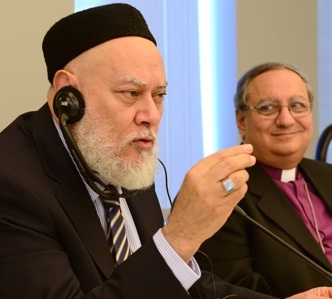Top Egyptian Cleric Tackles Extremism
Grand Mufti Mohammed Ali Goma’a has warned that the rising tide of sectarianism threatens to tear Egyptian society apart. Egypt’s highest authority on Islamic law has argued that religious leaders have a responsibility to challenge extremist narratives. He discussed challenges to Christian-Muslim relations with Bishop Mouneer Hanna Anis, the Anglican bishop of Egypt and North Africa, at a June 14 event hosted by the United States of Peace.
 Grand Mufti Mohammed Ali Goma’a has warned that the rising tide of sectarianism threatens to tear Egyptian society apart. Egypt’s highest authority on Islamic law and head of al Azhar — one of the world’s top institutions of Sunni learning— has argued that religious leaders have a responsibility to challenge extremist narratives. Goma’a has undertaken programs with Coptic Christians to promote tolerance. Ultraconservative Salafis have cursed the cleric for his views. He discussed challenges to Christian-Muslim relations with Bishop Mouneer Hanna Anis, the Anglican bishop of Egypt and North Africa, at a June 14 event hosted by the United States of Peace. The following are excerpted remarks by the grand mufti.
Grand Mufti Mohammed Ali Goma’a has warned that the rising tide of sectarianism threatens to tear Egyptian society apart. Egypt’s highest authority on Islamic law and head of al Azhar — one of the world’s top institutions of Sunni learning— has argued that religious leaders have a responsibility to challenge extremist narratives. Goma’a has undertaken programs with Coptic Christians to promote tolerance. Ultraconservative Salafis have cursed the cleric for his views. He discussed challenges to Christian-Muslim relations with Bishop Mouneer Hanna Anis, the Anglican bishop of Egypt and North Africa, at a June 14 event hosted by the United States of Peace. The following are excerpted remarks by the grand mufti.
Extremism
“People curse each other on the internet and social media night and day. Salafis curse me. What does that mean? Do curses prevent me from coming to the United States with Bishop Mouneer? ... One has a civic responsibility to do something, not to be scared [of threats] and do nothing.
“Al Azhar has a big role in… changing this type of religious discourse and isolating this hatred. [The goal is to] either change it or prevent it before it comes about.
“On the issue of convincing close-minded people with extremist views, there are two types of people. Some [extremists] are closer to us. We can bring them in, guide them, calm them down and move from away from narrow-mindedness. Others are farther removed, and there is no hope for those people. We have to protect youth from their influence.”
Lessons from the United States
“I was visited once by a group from the U.S. Congress and I asked them about what to do about these [extremist television] channels. You have had a democratic experience in America. What if there was a channel that talks about usurping society and promotes communism like what Russia had? They said they would just leave it be. In America, there is a communist party, but it has very few members. People know this is not the right path… Former President Hosny Mubarak shut down these [extremist] channels before he left office. Should we close them, open them or close them half way? It is not clear.
“We [Egyptians] want to learn from the American experience with democracy and see how to apply it in Egypt. What happens we you have a channel that curses American people, or you do not have this? If not, it is because people have knowledge and education. We have illiteracy in Egypt.”
Problems with the Media
“The media still goes by ‘If it bleeds, it leads.’ It publishes what is provocative rather than what is based on the 'Frankfurt School' ― things that build human intellect and communal understanding… The media is very productive in order to attract advertisements and increase profits for the stations, so the issue is really complicated.
“Do not blame just one guy in a mosque who has 200 people with him. The media speaks to millions of people. It has a very difficult role. Many outlets… take a provocative approach.”
Christians
“We always advise our Coptic Christian friends to be a part of the political process and not to look to the Salafis who are threatening. It is very important for the Copts to step up to their civic responsibility.”
Photo credit: United States Institute of Peace
Related Program

The Islamists
Learn more about Hamas and how it relates to similarly aligned organizations throughout the region. Read more










